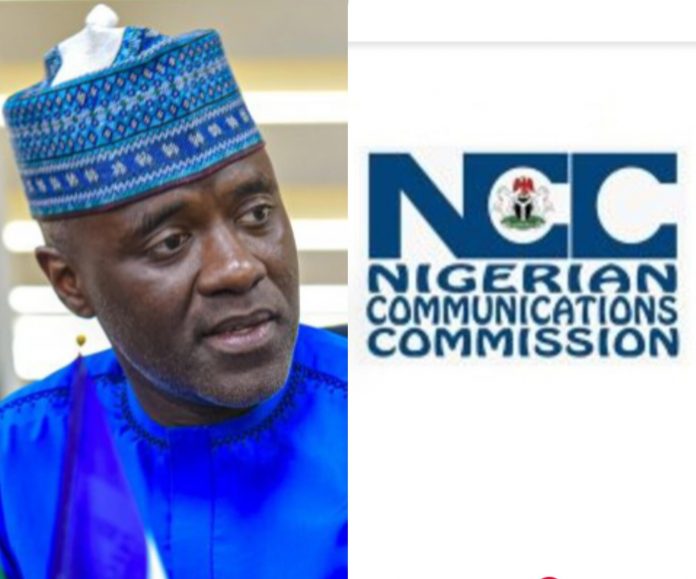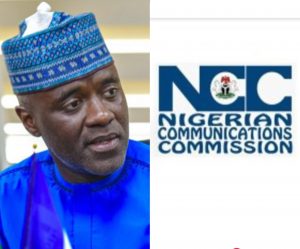A combined picture of Aminu Maida and NCC logo
By Our Reporter
The Nigerian Communications Commission (NCC), under the watch of the Chairman (EVC), Dr. Aminu Maida is currently grappling with an internal crisis
Maida’s tenure is under intense scrutiny following a surge of allegations that include fraudulent recruitment practices, manipulated promotions, and preferential treatment of certain regions in internal appointments.
Whistleblowers Targeted
Rather than addressing these allegations with transparency and a commitment to institutional reform, sources told SaharaReporters that the EVC has shifted focus to rooting out whistleblowers within the commission. Multiple internal sources described a climate of fear and intimidation in which long-serving and high-performing staff are being singled out and victimised without due process, accused of leaking sensitive information to the media.
According to these sources, the leadership’s campaign of intimidation is an attempt to stifle the growing chorus of staff who have spoken out about irregularities.
“The beginning of the war has just started,” one staff member squealed highlighting the resolve of those determined to expose wrongdoing despite the threat of reprisals.
Allegations of Nepotism and Manipulated Processes
Central to the unfolding crisis are claims of systemic manipulation of recruitment and promotion exercises at the NCC. The controversial promotion exercise, for example, allegedly skewed in favour of individuals from a particular region, is seen by many as undermining the principles of meritocracy and national unity.
Equally concerning are allegations of nepotism in the commission’s recruitment process. According to sources, several high-profile appointments have come under the spotlight: The daughter of the Senate Committee Chairman on Telecommunications, Senator Ikra Aliyu Bilbis, allegedly secured a position within the commission without competitive processes.
Another beneficiary is Tanimu Yakubu, reportedly the EVC’s cousin’s daughter, who was employed through backdoor channels.
Perhaps most troubling is the case of a relative of Senate President Godswill Akpabio, said to have been fast-tracked through probation and seconded to another agency, again bypassing standard recruitment procedures.
These cases, staff members argue, are not mere administrative oversights but a symptom of entrenched elite patronage and the erosion of institutional norms.
Sources noted that the implications of these allegations are far-reaching. When regulatory agencies become vehicles for personal and political patronage, public trust erodes, and the regulatory environment becomes compromised.
Therefore, the role of whistleblowers in exposing these practices, therefore, cannot be overstated.
Yet, according to staff members, the current leadership appears more focused on silencing dissent than addressing the underlying issues. In an era of digital transparency and heightened civil society oversight, this strategy is seen as shortsighted and ultimately ineffective.
Calls for Oversight and Reform
The revelations have prompted calls for urgent intervention from the National Assembly, the Presidency, and anti-corruption agencies.
Stakeholders warn that if left unchecked, the current crisis could deepen into broader procurement scandals, contract racketeering, and financial misappropriation.
Former insiders, including retired senior officials, have stressed the importance of returning to global best practices in regulatory oversight and governance. They argue that the NCC’s credibility—built over decades by dedicated professionals—must not be allowed to erode.
As one source hinted: “If the EVC believes that victimising staff will silence the truth, then he underestimates the very force that built this commission—courageous Nigerians committed to service, integrity, and justice.”Nigerian cultural tours
Recall that On March 9, 2025, some NCC staff members had raised damning allegations against the Commission’s leadership, claiming that the March 2025 staff promotion exercise was fraught with irregularities, favoritism, and a deliberate effort to sideline certain employees based on ethnicity, ideology, and internal politics.
An internal memo exclusively obtained by SaharaReporters and titled “2025 Staff Promotion Exercise: All Levels” revealed that a total of 239 staff members were promoted in the latest exercise.
According to the document, Freda Bruce-Bennett and Usman Mamman were elevated to the rank of Director. Those promoted to Deputy Director include Tijjani Monguno, Janet Asagh, Tolulase Omodele-Rufai, Solomon Igbayue, Yahaya Abubakar, Shafii Ndanusa, Nafisa Usman Rugga, Atiku Lawal, and Bala Usman.
The list of newly promoted Assistant Directors features Sanusi Bawa, Azibanato Cliff-Eribo, Ebinimi Tebepah, Jebosa Ezeamaka, Mohammed Ahmed Lawal, Kolawole Owolabi-Lawal, Nnamnso Ituen, Christiana Aiyenitaju, Abdullahi Kwalli, Lydia Olusan, Idayat Tijjani-Akande, and Yaya Wali.
The promotions took effect from January 1, 2025.
In a statement issued by a group identifying as the “Concerned Staff of the Nigerian Communications Commission,” the workers decried what they described as “a fraudulent, bigoted, and sadistic process” that not only undermined fairness and merit but also contravened established Public Service Rules.Nigerian cultural tours
Shoddy Process, Discriminatory Outcomes
The aggrieved staff accused the Human Capital Department (HCD), led by Director Hafsat Lawal, of organising an examination riddled with logistical failures and inequity. According to the statement, some candidates were made to take the promotional examinations for nearly 24 hours, from 9:00 a.m. one day until 4:00 a.m. the next. The HCD later issued an apology via email, acknowledging the poor conduct.
“For instance, candidates who reported for examination before 9.00am were still being examined as at 04.00am the following day,” they said.
An apology letter signed by Lawal, said, “I hope this message finds you well. I want to take a moment to sincerely apologise for the inconveniences many of you faced during the recent promotion examination.
“I take full responsibility for the disruptions caused on the day of your promotion exercise which resulted in significant delays for many of you. I deeply regret that you had to experience these challenges, especially while some of you were fasting and without proper meals.”
“This is not the support you deserve, and I am truly sorry for any distress this may have caused. Your well-being is incredibly important to me, and I am committed to making improvements,” she added.
Beyond logistics, the staff stated that promotion outcomes overwhelmingly favoured those previously selected for elite foreign training and conferences—most notably at Harvard University and the London School of Economics—while hard-working staff with no such privileges were ignored. They described the selection process for training as “cliquish and cronyistic,” fostering a climate of resentment and division within the commission.
Violation of Public Service Rules
Central to their protest was the claim that the NCC unilaterally raised the pass mark for promotion from the 60% stipulated in the Public Service Rules to 70%, without presidential approval or waiver from the Head of the Civil Service of the Federation. The staff noted that despite scoring above 60%, many candidates were denied promotion. A lawyer representing some of the affected staff had reportedly identified 10 legal grounds to challenge the results and vowed to escalate the matter to the Industrial Court if necessary.
Allegations of Ethnic Bias and Marginalisation
Of particular concern is what the staff termed a “blatant disregard for federal character.” In one promotion batch from Principal Manager to Assistant Director, no staff member from the Southeast geopolitical zone was reportedly included. In another batch from Assistant Director to Deputy Director, only one southerner made the list. This, despite claims that assessment panels had representatives from all zones.
The Concerned Staff dismissed such representation as symbolic at best, and potentially compromised at worst.
One striking case involved a highly respected staffer known for academic brilliance and professional performance, whose name was omitted despite consistently stellar results. The individual was said to be among those organising to form a staff union in response to what has been described as “tyranny and bad governance” under the current NCC leadership.
Attempts to reach the Nigerian Communications Commission (NCC) for comments were unsuccessful. Its Director of Corporate Communications, Nnenna Ukoha, who initially said she was in a meeting and would respond later in the day, did not answer further calls.


